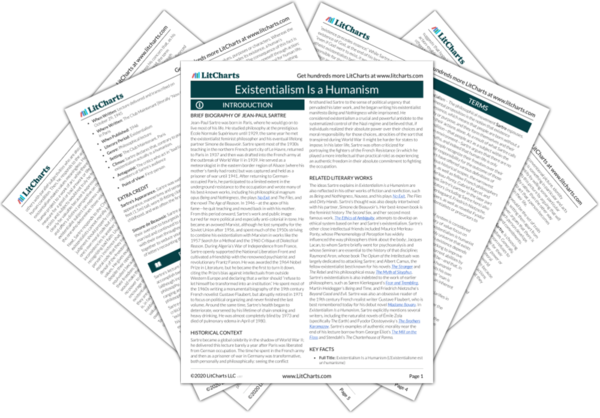Existence, Essence and the Human Condition
The driving observation behind Sartre’s existentialism is his notion that “existence precedes essence.” For Sartre, there is no preexisting human essence, set by God or nature, that determines what people should or will do. As a result, each individual must define their own essence, and their essence is merely the sum of their actions.
Essence, broadly, refers to the necessary properties that make a thing what it is. For at least two thousand years…
read analysis of Existence, Essence and the Human ConditionAbandonment and Atheism
Sartre’s search for a new way to think about human life’s value is largely a response to the decline of religion in the modern world. Sartre is explicit about his atheism and believes that humans create morality for their own purposes, rather than receiving it from some supernatural source. Because of this, he suggests that people are “abandoned” in the world, and he thinks that, whether people choose to recognize it or hide…
read analysis of Abandonment and AtheismRadical Freedom, Choice, and Responsibility
Based on Sartre’s argument that there is no fixed morality or human nature to determine human action, he believes that humans have radical freedom. This means that people have the absolute power to choose how they will act in any given situation and in their lives as a whole. Tomorrow morning, anyone could choose to become a vegan or take up snowboarding, quit school to become a farmer, or go on a crime spree…
read analysis of Radical Freedom, Choice, and Responsibility
Existentialism and Its Critics
In Existentialism is a Humanism, Sartre has two central motives: responding to his critics, and explaining his philosophy for a broader audience that has begun using the term “existentialism” without understanding what it really means. Sartre is stuck in the difficult position of answering critics from two opposite sides. On the first side are Christians who think existentialism has no hope for humanity, makes values too relative, and remains too focused on…
read analysis of Existentialism and Its Critics






